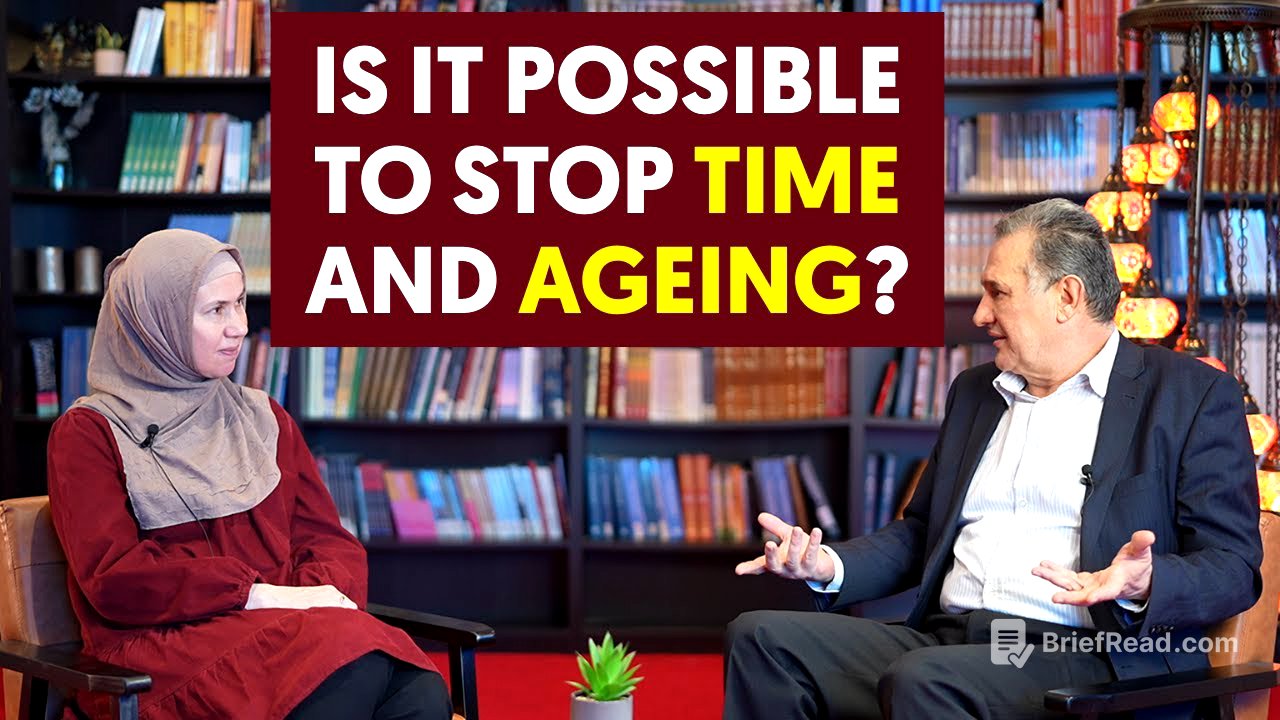TLDR;
This video explores the concept of time, aging, and death from both scientific and Islamic perspectives. It discusses the nature of time, the possibility of time travel, the reasons for aging, and the Islamic view of death as a blessing. The conversation touches on the human desire for eternity and where we should seek it.
- Time is relative and flows at different speeds depending on gravity and velocity.
- Theoretically, time can be stopped by traveling at the speed of light, but this is impossible for matter.
- Aging occurs due to biological factors and the second law of thermodynamics (entropy).
- Islam views death as a natural part of life and a blessing, as eternal life is promised in the afterlife.
- Humans instinctively seek eternity, but often look for it in the wrong place (this world).
Introduction [0:00]
The podcast episode introduces a discussion about time, specifically whether the flow of time can be stopped. This question is linked to the possibility of stopping aging and preventing death, which has implications in Islam regarding divine decree and predestination. The hosts aim to explore these concepts from both scientific and Islamic viewpoints.
Time cannot be defined [1:00]
Time is difficult to define, although we are very good at measuring it. Time is generally defined as the period that passes between a series of events. In physics, it's often described as a river flowing in one direction, but time flows at different speeds in different parts of the universe. Gravity and velocity affect the flow of time; greater mass and speed cause time to slow down, a phenomenon known as time dilation. There is no universal "now" because time is relative to the observer's location and speed.
Theoretically you can go forward in time [7:49]
Theoretically, going forward in time is possible. If a spacecraft could travel at 99.9999% of the speed of light, astronauts could reach Alpha Centauri in 4.3 years, but for them, it would only feel like 21 days. Upon returning to Earth after two months, almost ten years would have passed for those on Earth. While traveling back in time poses philosophical paradoxes, traveling forward is theoretically possible by exploiting time dilation.
Two reasons why ageing occurs [10:17]
Aging occurs due to two primary reasons: biological factors and thermodynamics. Biologically, cells eventually fail to copy themselves accurately due to the shortening of telomeres in DNA. Research is being conducted to reverse this process. The second reason is entropy, as described by the second law of thermodynamics, which states that everything moves from order to disorder and eventually wears out.
Nothing is eternal [12:05]
The Quran states that everything will perish except Allah. This aligns with the scientific understanding that the universe is heading towards energetic death. The desire to prolong life is questioned, suggesting that humans instinctively seek eternity but often look for it in the wrong place.
Death is a blessing [14:11]
Death is a blessing because eternal life on Earth would become tedious and undesirable due to the physical limitations and deterioration of the body. Humans instinctively seek eternity, but this desire is meant to be fulfilled in the afterlife, where different laws of physics and a renewed creation will allow for eternal existence. Examples like the immortal jellyfish and natural cycles on Earth offer glimpses of the possibilities of renewal and eternal life. The longing for eternity should be directed towards the afterlife, as promised in the Quran, rather than this temporary world.









